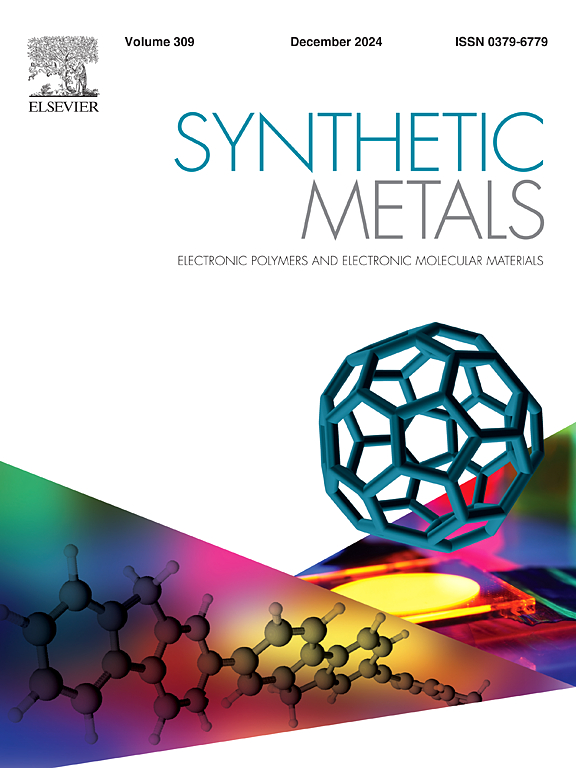Dimethoxyphenoxy alpha-substituted metal-free, and metal phthalocyanines: Electrochemical redox, in-situ spectroelectrochemical and electrochromic properties
IF 4.6
3区 材料科学
Q2 MATERIALS SCIENCE, MULTIDISCIPLINARY
引用次数: 0
Abstract
In this study, (2,3-dimethoxy)phenoxy alpha-substituted CoPc (2) and CuPc (3) complexes were newly synthesized and spectrally characterized. The electrochemical, in situ spectroelectrochemical, and electrochromic properties of CoPc (2), CuPc (3), ZnPc (4), and H2Pc (5) were also investigated. This investigation discussed the electron-releasing effect of the methoxy (-OCH3) groups on the outermost part of the molecule compared with a previously reported (2,6-dimethoxy)phenoxy cobalt phthalocyanine. The results revealed that changing the binding positions of the substituting groups of the phthalocyanines led to detectable changes in the redox properties of complexes. The CoPc (2) showed additional redox processes and in situ spectroelectrochemical changes under potential during these processes compared to other complexes due to the redox-active nature of the metal center. Thus, the electrochromic features of the films of these complexes on indium-tin-oxide (ITO) electrodes were also identified and discussed. The films of the complexes displayed promising electrochromic responses with reversible redox processes, fast coloration, and high optical stability. ITO/CoPc (2) had the best electrochromic properties among these phthalocyanine films thanks to its rich redox nature.
二甲氧基苯氧基α-取代的无金属和金属酞菁:电化学氧化还原、原位光谱电化学和电致变色特性
本研究新合成了(2,3-二甲氧基)苯氧基α-取代的 CoPc (2) 和 CuPc (3) 复合物,并对其进行了光谱表征。此外,还研究了 CoPc (2)、CuPc (3)、ZnPc (4) 和 H2Pc (5) 的电化学、原位光谱电化学和电致变色特性。与之前报道的(2,6-二甲氧基)苯氧基钴酞菁相比,该研究讨论了分子最外层甲氧基(-OCH3)基团的电子释放效应。结果表明,改变酞菁取代基的结合位置会导致配合物的氧化还原特性发生可检测到的变化。与其他配合物相比,CoPc (2) 由于金属中心的氧化还原活性,在这些过程中显示出额外的氧化还原过程和电位下的原位光谱电化学变化。因此,我们还确定并讨论了这些配合物薄膜在氧化铟锡(ITO)电极上的电致变色特性。这些复合物薄膜显示出良好的电致变色反应,具有可逆的氧化还原过程、快速着色和高光学稳定性。在这些酞菁薄膜中,ITO/CoPc (2) 的电致变色性能最好,这要归功于其丰富的氧化还原性质。
本文章由计算机程序翻译,如有差异,请以英文原文为准。
求助全文
约1分钟内获得全文
求助全文
来源期刊

Synthetic Metals
工程技术-材料科学:综合
CiteScore
8.30
自引率
4.50%
发文量
189
审稿时长
33 days
期刊介绍:
This journal is an international medium for the rapid publication of original research papers, short communications and subject reviews dealing with research on and applications of electronic polymers and electronic molecular materials including novel carbon architectures. These functional materials have the properties of metals, semiconductors or magnets and are distinguishable from elemental and alloy/binary metals, semiconductors and magnets.
 求助内容:
求助内容: 应助结果提醒方式:
应助结果提醒方式:


